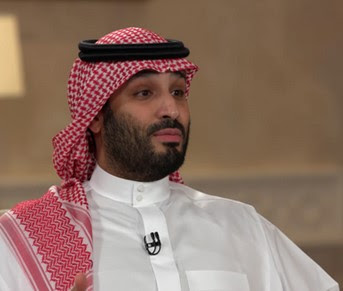| By MEMRI – |
To mark the fifth anniversary of Saudi Arabia’s Vision 2030, Saudi Crown Prince Mohammed bin Salman sat down to a lengthy and comprehensive interview with journalist ‘Abdallah Al-Mudaifer. Aired on several Saudi channels, the interview touched on political, economic and social issues, and also included far-reaching statements regarding the religious character of the Saudi kingdom and the sources for its legislation. Bin Salman stated that legislation must be based only on explicit stipulations of the Quran and the Prophet’s Sunna, while using them as a tool for developing the country and adapting it to the needs of the citizens and to internationally-accepted norms. He rejected the claim that Saudi Arabia is a “Wahabi state,” clarifying that it is always possible to apply independent reasoning (ijtihad) in interpreting the shari’a. “If Sheikh Mohammed bin ‘Abd Al-Wahhab rose from his grave and saw that we are committed to his text, while locking our minds to ijtihad, thus deifying him and blowing [his significance] out of proportion, he would be the first to oppose this,” bin Saman said. These statements by bin Salman reflect a significant shift in the perception of religion-state relations in the kingdom, which may pave the way to further reforms in addition to those that have already been enacted there in the recent years. Saudi Crown Prince Muhammed bin Salman during the interview (Source: Alarabiya.net, April 27, 2021) Mohammed Bin Salman: We Are Not Wahhabis; It Is Always Possible To Engage In IjtihadIn the interview bin Salman rejected the claim that Saudi Arabia is a Wahhabi state, i.e., follows the conservative perception of 18th century Islamic scholar Mohammed ‘Abd Al-Wahhab, an associate of the founder of the Saudi kingdom Mohammed bin Sa’ud. He explained that the kingdom’s interpretation of Islam is not confined to the directives of Mohammed bin ‘Abd Al-Wahhab, and that Saudi Arabia is “not committed” to any specific Islamic school of jurisprudence, but follows the four canonical Sunni Islamic schools: Hanbali, Shafi’i, Maliki and Hanafi. He added: “Being committed to a single school of thought or a single scholar is tantamount to deifying human beings… Allah sent the Quran, and the Prophet implemented it on the ground, and ijtihad is open for all eternity. If Sheikh Mohammed Bin ‘Abd Al-Wahhab rose from his grave and saw that we are committed to his text, while locking our minds to ijtihad, thus deifying him and blowing [his significance] out of proportion, he would be the first to oppose this.” This is not the first time bin Salman has rejected the definition of Saudi Arabia as a Wahhabi state. In an April 2, 2018 interview with The Atlantic, he said, “There is no Wahhabism. We don’t believe we have Wahhabism.” These statements in fact conform to the narrative that Saudi Arabia has been adopting for years, especially since Al-Qaeda’s 9/11 attacks on the U.S., 15 if whose perpetrators were from Saudi Arabia. Saudi officials have often denied that the kingdom is dominated by a Wahhabi ideology that fosters extremism, calling this is a false accusation directed at the kingdom by its enemies in an attempt to blacken its reputation. They clarified that Saudi Arabia is a salafi state following the original Islam of the Prophet and his companions, and espouses wasatiyya, namely the middle-road approach in Islam, which the Muslim Brotherhood also claims to endorse. King Salman bin ‘Abd Al-‘Aziz, the crown prince’s father, was among those who came out against the Wahhabi label. In 2010, while serving as governor of Riyadh district during the reign of his brother, ‘Abdullah bin ‘Abd Al-‘Aziz, he claimed that the term “Wahhabism,” which is used derogatively, has nothing to do with the approach of Mohammed bin ‘Abd Al-Wahhab, which is a salafi approach. Bin al-Wahhab and his followers, he elaborated, adhered to the original Islam of the Prophet and his companions, while “Wahhabism” is a term that was coined in order to slander them as the inventors of a separate school of religious thought.” After his statement prompted several responses in the Al-Hayat daily, bin Salman published an article in the paper in which he reiterated his claim that there is no Wahhabi school. He wrote: “It is a mistake to claim that the term Wahhabi resembles [the names of] the four schools [of Sunni Islam], because this implies that Sheikh [Mohammed bin ‘Abd Al-Wahhab] founded a new school, when in fact he relied in his fatwas and religious opinions on the four [recognized] schools [of Islam]. Even the claim that Wahhabism has become another facet of salafism is wrong, because the correct salafism is the way of life of our righteous ancestors, who were committed to the Quran and the Sunna. Sheikh Mohammed bin ‘Abd Al-Wahhab preached a return to this way of life. Contrary to the view that is unfortunately widely held in the modern age, his preaching did not use salafism for political aims… Sheikh Mohammed bin ‘Abd Al-Wahhab’s preaching is neither a new method nor a new idea, and I again challenge anyone who can find in the sheikh’s writings or letters any deviation whatsoever from the holy writings, or from the deeds and actions of our righteous ancestors, to bring them to us. I call on writers and researchers not to be carried away by those who claim that [there is nothing wrong with] using the term Wahhabism [and that this] is only a matter of terminology. These people are forgetting that the real aim of spreading this term is to sully the correct and pure salafism, which has no messages that contradict those presented in the Quran and the directives of the Prophet Mohammed. Furthermore, such sullying is being done by various elements who do not like either [Mohammed bin ‘Abd Al-Wahhab’s] preaching or what it led to, that is, the establishment of… the Saudi state…” Mohammed Bin Salman: We Will Make Laws Based On Explicit Directives Of The Quran And Sunna And In Line With International Norms Bin Salman did not suffice with renouncing Wahhabism, but also made other pragmatic statements regarding jurisprudence and legislation in Saudi Arabia, saying: “Fatwas are subject to judgement of time and place. For example, if an honorable sheikh issued a fatwa 100 years ago, without knowing whether the world is round or not, and having no knowledge about the continents, about technology, and so on, his fatwa was based on the data and information that were at his disposal, and on his understanding of the Quran and the Sunna. But these things have changed in our current situation. Ultimately, the Quran and the Sunna constitute our source of authority, as I said.” The crown prince added that, in relying on the Sunna, it is best to follow hadiths conveyed by multiple people (hadith mutawatir), which are few but whose authenticity is very much substantiated, and their interpretation is subject to ijtihad, depending on time, place and on the understanding of their content. He added: “Our constitution is the Quran. It was, it is, and it will continue to be for all eternity. In social and personal matters we are only compelled to implement the texts that are explicitly mentioned in the Quran. In other words, I cannot carry out a punishment prescribed by the shari’a unless it is backed by a clear reference in the Quran or the Sunna.” He added: “Our role is to make sure that the laws legislated in Saudi Arabia do not violate the Quran and the Sunna… Also, we need to make sure that these laws reinforce our interests and protect the security and interests of the citizens and help in the development and prosperity of the country. With this in mind, we legislate laws that are in line with the international norms. You want tourists to come. Your goal is to have 100 million tourists, in order to create three million jobs. But if you announce that you invented a new [legal system] that does not follow the internationally-recognized laws, those tourists will not come.” Bin Salman’s messages, delivered in Arabic and aired on several Saudi channels, were clearly directed at Saudis, among others. His statement that legislation must be based on explicit Quranic directives and on specific hadiths, and on the interests of the citizens, is apparently meant to prepare the ground for future reforms and legal amendments. They may in fact be aimed at preparing the ground for the approval of a personal status draft law he initiated and presented in February 2021 along with several other draft laws, and which, he said, will take into account international modern legal trends while also complying with the shari’a. Statements by Saudi Justice Minister about these expected reforms indicate that the most significant of them will be a ban on underage marriage, which is prevalent in the kingdom. A reform in this area will be another in a series of social reforms bin Salman has been advancing and implementing under his father’s rule, such as the legal amendments permitting women to drive, easing the guardianship requirements for women, improving the situation of divorced women, among other reforms. Mohammed Bin Salman: Extremism Holds The Kingdom Back In the interview bin Salman also addressed the issue of extremism and terrorism in Saudi Arabia, saying that “progress is impossible as long as there is extremist thinking in the kingdom,” which thwarts even economic development and growth. He noted that Saudi Arabia itself is a target for extremist organizations and that “anyone who espouses extremist ideology, even if he is not a terrorist, is a criminal who should be prosecuted according to the law.” Read The Full Report |
Recent Posts





